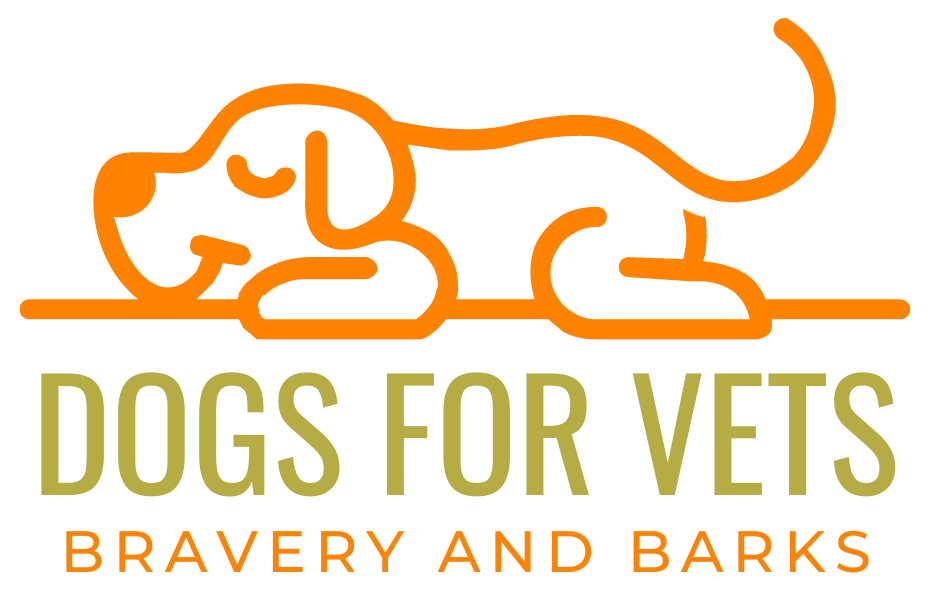This post may contain ads and affiliate links and we may earn a small commission when you click on the links at no additional cost to you. As an Amazon Affiliate, we earn from qualifying purchases. You can read our full disclaimer here.
Fostering Senior Dogs: The Ultimate Guide to a Heartfelt Journey
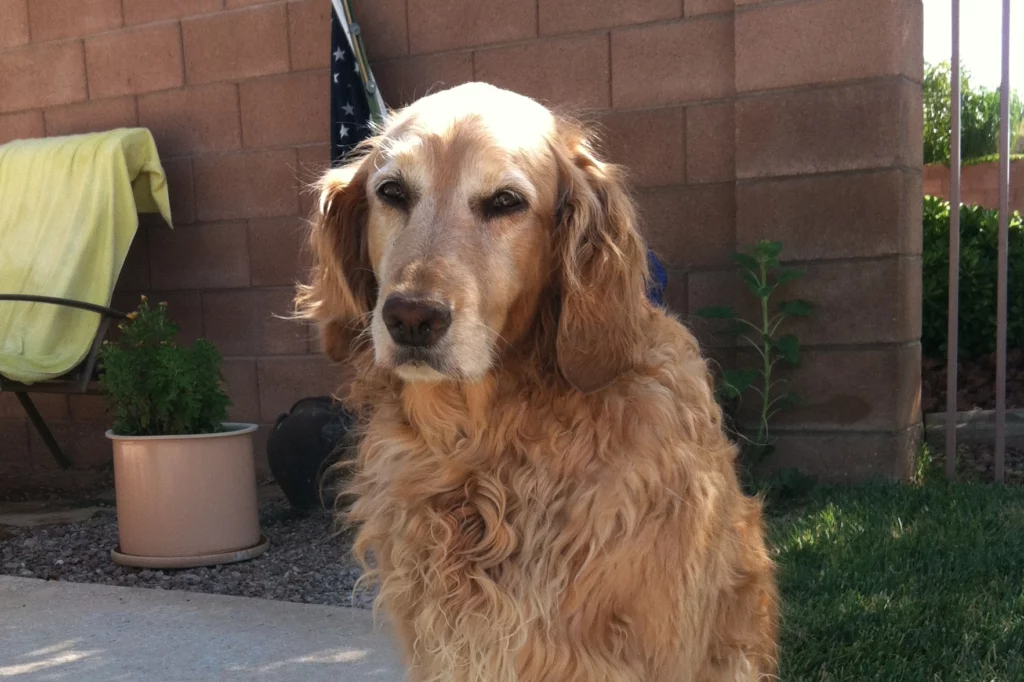
When I first delved into the world of fostering senior dogs, I never imagined the profound impact it would have on my life.
I mean, I always knew dogs were special, but my dogs Daisy and Gunner? They’re my heartbeats. Daisy, an elegant 11-year-old Golden Retriever, carries a grace that belies her age. She still has that playful glint in her eyes, especially when she’s up to mischief.
And then there’s Gunner, a vivacious 10-year-old Goldendoodle. His boundless enthusiasm never fades, reminding me every day that age is, after all, just a number.

The Deep Bond from Fostering Senior Dogs: Senior Citizens and Senior Dogs
The connection between senior citizens like me and senior dogs is something magical. Here’s the thing:
- Both of us have seen and experienced the ebb and flow of life.
- We cherish the quiet moments, the gentle pats, and the long, relaxed walks.
- There’s an understanding, an unspoken bond, that forms when two souls recognize the beauty of life’s twilight.
It’s not just about companionship. It’s about shared memories, lessons learned, and understanding life’s fragilities.
The Meaning Behind Fostering Senior Dogs
Fostering is more than just opening up your home to a pet in need. It’s about opening up your heart, understanding their past, and giving them a future. For senior dogs, this gesture means even more. Here’s why:
- Many senior dogs in shelters have been abandoned or have lost their homes due to circumstances beyond their control.
- They’re often overlooked because people want the playful puppy, the Instagrammable moments.
- By fostering a senior dog, you’re giving them a second chance, a shot at love and care in their golden years.
To me, fostering senior dogs is like reading the last few chapters of a book, ensuring they are filled with love, warmth, and security. And believe me, the joy and gratitude these old souls bring into our lives? It’s nothing short of pure, unfiltered magic.
Understanding Senior Dogs

Navigating the world of senior dogs is like stepping into a realm of wisdom, patience, and a unique kind of joy. Before we foster or adopt them, it’s crucial to really understand what it means for a dog to be “senior.”
What Makes a Dog “Senior”?
Age Benchmarks for Various Breeds:
- Small Breeds (like Chihuahuas, Toy Poodles): Often considered senior around 10-12 years.
- Medium Breeds (like Beagles, Spaniels): Typically reach senior status around 8-10 years.
- Large Breeds (like Golden Retrievers, Labradors): Generally considered senior by 6-8 years.
- Giant Breeds (like Great Danes, Mastiffs): Can be deemed senior as early as 5-6 years.
Remember, these are general guidelines. Individual dogs might show signs of aging earlier or later than the typical range.
Physical and Behavioral Changes to Expect:
- Slower Pace: Your sprightly puppy may now prefer leisurely strolls over sprints in the park.
- Gray Hairs: Just like us, dogs might sport a distinguished gray muzzle or patches as they age.
- Hearing and Vision Loss: Don’t be surprised if your senior dog doesn’t respond immediately. They might be facing a decrease in their sensory capabilities.
- Sleeping More: Those long afternoon naps? Totally normal for our older pals.
- Health Issues: Arthritis, dental issues, and other health challenges can emerge. Regular vet check-ups become even more critical.
- Cognitive Changes: Just as humans might face dementia, dogs can experience cognitive dysfunction syndrome, which might lead to altered sleep patterns or confusion.
In essence, as dogs age, they undergo transformations, both physically and behaviorally. Being cognizant of these changes helps us provide them with the care, love, and patience they truly deserve.
Health Concerns of Senior Dogs
As our four-legged friends gracefully trot into their golden years, they, like us, may encounter a few health hiccups along the way. Understanding these concerns not only ensures their comfort but also helps in building a stronger bond filled with empathy and care.
Common Health Problems:
- Arthritis: Just as it sounds, it’s a joint problem. You might notice your dog limping, hesitating to climb stairs, or having difficulty getting up after lying down. Soft bedding and joint supplements can offer relief.
- Dental Issues: If Fido’s breath is a tad too stinky, it’s worth checking out his pearly whites. Tartar buildup, gum disease, or even tooth loss can plague senior dogs. Regular brushing and dental treats can help combat this.
- Diminished Eyesight and Hearing: Those puzzled looks or the slight delay in response might not be confusion. Cataracts or age-related hearing loss are common. Adjusting home setups or using hand signals can make their world a lot more navigable.
Dietary Needs and Changes:
- Caloric Intake: As they become less active, their caloric needs might decrease. However, this doesn’t mean they need less nutrition. Opt for high-quality senior dog food that’s nutrient-rich but less calorie-dense.
- Supplements: Consider adding fish oil for coat health, glucosamine for joints, or other vet-recommended supplements to their diet.
- Hydration: Ensure they always have access to fresh water. Older dogs can get dehydrated quickly, especially if they’re on certain medications.
The Imperative of Regular Veterinary Checks:
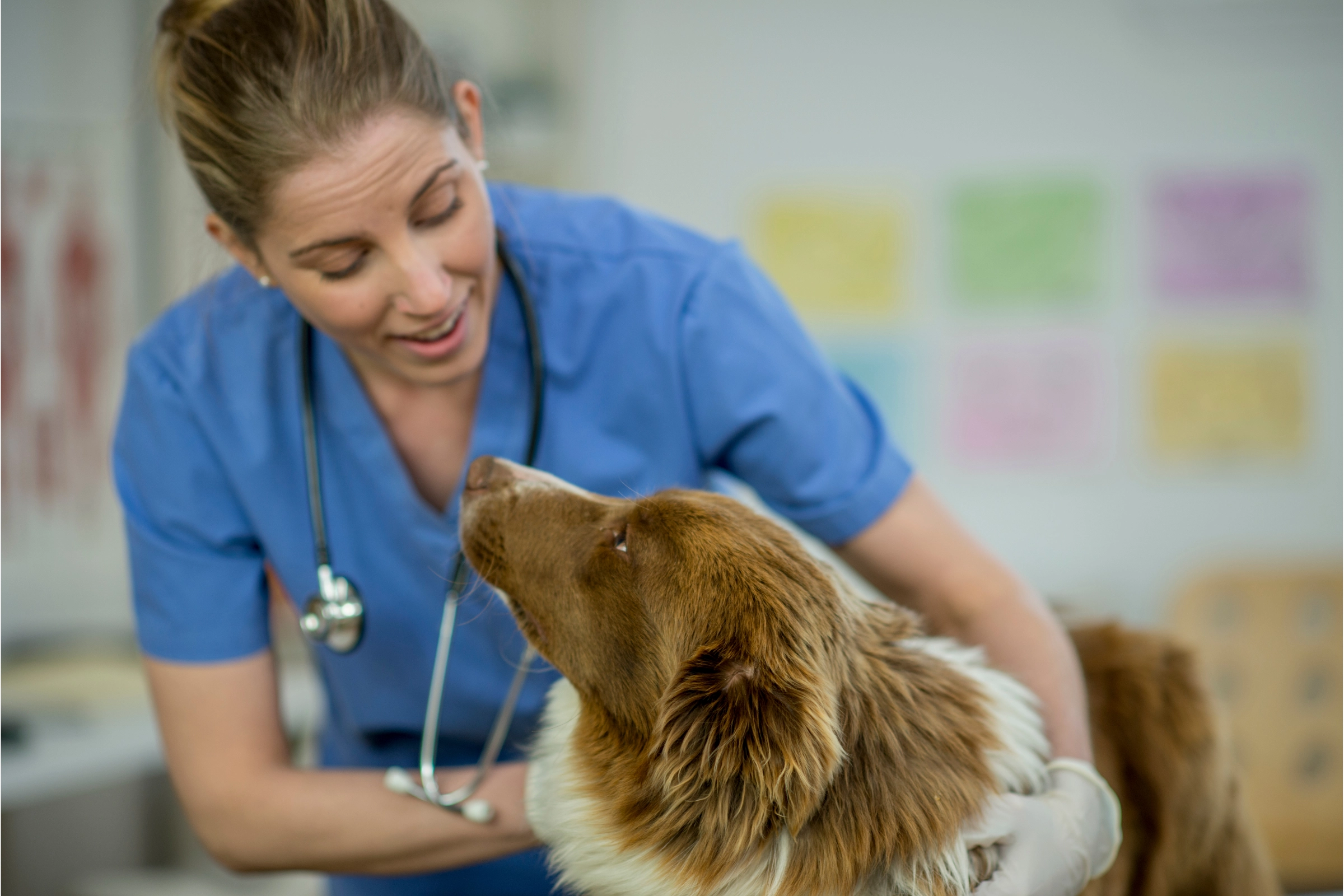
- Routine Check-ups: While annual visits are standard for younger dogs, seniors benefit from more frequent check-ups—say, every 6 months. This helps in early detection of potential health issues.
- Bloodwork and Other Tests: Comprehensive tests can provide insights into their organ functions and overall health.
- Vaccinations and Parasite Prevention: Age doesn’t give them a pass. Keeping up with their vaccination schedule and ensuring they’re protected from fleas, ticks, and worms is paramount.
With age might come a few challenges, but with the right care, our senior dogs can thrive, enjoying their golden years in comfort and happiness.
Benefits of Fostering Senior Dogs vs. Puppies
When contemplating the idea of fostering a dog, the image of a playful, bouncy puppy might be the first to come to mind. However, fostering senior dogs presents a plethora of benefits that often go overlooked.
From their predictable personalities to their genuine appreciation for a second chance at love, here’s a deep dive into why senior dogs can be the ideal choice for many prospective foster homes.
Predictable Personalities: Knowing What to Expect
- Consistency Over Time: With a senior dog, what you see is generally what you get. Their personalities have solidified, giving you a clear picture of their temperament, likes, and dislikes.
- Fewer Surprises: Puppies, while adorable, are often like mystery boxes. As they grow, their behaviors, size, and temperaments can change. Senior dogs, on the other hand, provide a sense of stability in terms of behavior.
- Tailored Companionship: Knowing their personalities allows you to better match a senior dog to your lifestyle. Whether you want a laid-back companion or a slightly spirited old-timer, you can find the perfect fit.
Generally Lower Energy Levels: Less Destructive Tendencies
- Ease of Management: Older dogs typically have mellowed out, reducing the risk of mischievous escapades or the sudden urge to dig up your garden.
- Fewer Demands: While puppies might require constant attention and playtime, senior dogs are often content with a short walk and a cozy spot beside you on the couch.
- Minimal “Puppy Proofing”: Puppies are notorious for their teething phase, leading to potential household destruction. With seniors, there’s usually no need to hide shoes or valuables out of chewing range.
Often Already Trained
- House-trained: One of the significant perks of older dogs is that they usually come house-trained, sparing you the ordeal of midnight accidents or the constant need for bathroom breaks.
- Basic Commands: Many senior dogs have a grasp on basic commands like ‘sit’, ‘stay’, or ‘come’. This not only makes communication easier but also creates a seamless integration into your household.
- Social Skills: Having been around the block, senior dogs often have better social skills, knowing how to interact with other animals and people. This can save you the effort of teaching puppy etiquette.
Filling a Pressing Need: Older Dogs are Often Overlooked in Shelters
- Heartbreaking Reality: Senior dogs have a lower adoption rate compared to puppies. Many of them spend their final years in the cold environment of a shelter, longing for a family.
- Myth Busting: Some potential adopters or foster parents believe that senior dogs come with baggage or are in the shelter due to behavioral issues. In reality, many of them are there due to circumstances like the passing of an owner, economic hardships, or relocations.
- Immediate Impact: By choosing to foster a senior dog, you’re directly impacting the life of a creature who might have otherwise been overlooked. The joy and gratitude you receive in return? Immeasurable.
While the effervescence of puppies is undeniably infectious, the calm, appreciative demeanor of senior dogs brings its own set of rewards.
By understanding and valuing the myriad benefits they bring, we not only enrich our own lives but also provide these old souls with the love and comfort they so rightly deserve.
The Emotional Rewards
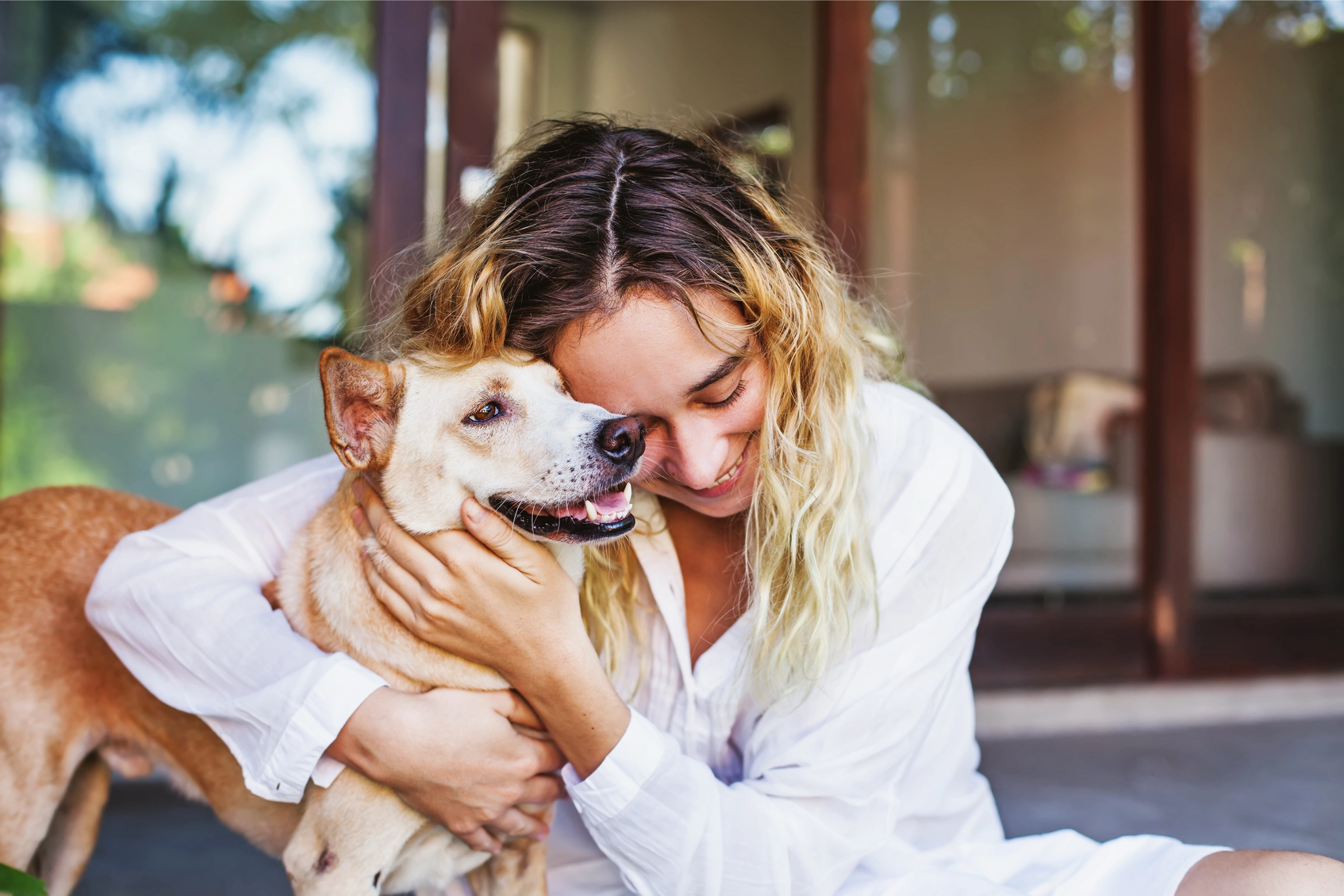
Venturing into the realm of fostering senior dogs is not just about the tangible responsibilities and routines. It’s an emotional journey, rich in transformative experiences, profound connections, and life-altering lessons. Here’s a deeper dive into the heartwarming rewards that come with giving a senior dog a loving home.
The Joy of Offering a Loving Twilight Home
- A Safe Haven: There’s an unparalleled sense of fulfillment in knowing that you’ve become the sanctuary, the safe space, for a dog that has seen years of life, both good and bad. Your home becomes their refuge, a place where memories are cherished and new ones are made.
- End-of-Life Care: The knowledge that you’ve given an aging dog a place to relax, be loved, and be cared for during their final years, months, or even days is deeply fulfilling. It’s a profound gesture of kindness that resonates deeply within the soul.
- Celebrating Milestones: Each day becomes a celebration. Whether it’s the extra wag in their tail, a playful moment, or just a calm evening cuddled up together, every moment becomes a milestone, a testament to the love you’ve provided.
Learning Patience and Compassion
- Understanding Their Pace: Senior dogs move at their own rhythm, teaching us to slow down, to appreciate the little moments, and to cultivate patience in our fast-paced lives.
- Empathetic Bonding: Their vulnerabilities, be it health-related or emotional, teach us the essence of compassion. We learn to step into their shoes (or paws), understanding their needs, fears, and desires.
- Life’s Fragilities: Through their eyes, we come to recognize the fragilities of life, understanding the importance of cherishing every moment and making it count.
Experiencing the Gratitude of an Older Dog
- Unspoken Thanks: It’s in the way they lean into you, the contented sighs, the soft gaze. Senior dogs have a way of expressing their gratitude, not through words, but through countless little gestures that speak volumes.
- Loyalty Amplified: While all dogs are known for their loyalty, with senior dogs, it feels magnified. Every act of kindness you offer is reciprocated with unwavering loyalty and affection.
- Building Trust: When a senior dog, who may have faced past traumas or been uprooted from a previous home, begins to trust you, it’s a reward like no other. It’s a testament to the resilient nature of their hearts and the depth of the bond you’ve forged.
Fostering senior dogs is much more than a noble act; it’s a deeply emotional and transformative journey. The rewards, though intangible, leave lasting imprints on our hearts, teaching us invaluable lessons about love, life, and the simple joys that come from genuine connections.
Fostering Senior Dogs for First-Timers
Embarking on the fostering journey, especially for the first time, can be both exciting and nerve-wracking. The immense joy of welcoming a senior dog into your life is often accompanied by a plethora of questions and uncertainties.
Let’s delve deep and unravel the essentials of fostering, ensuring a smooth transition for both you and your senior furball.
Understanding Your Role as a Foster
- Temporary vs. Potentially Permanent Fostering:
- Temporary Fostering: This is often short-term, ranging from a few days to several months. The goal is to provide a bridge-home until the senior dog finds a permanent adoptive family.
- Permanent or “Fospice” Fostering: In certain situations, due to the dog’s age or health issues, the goal is not adoption but rather to give them a comfortable home for the remainder of their life.
- Providing a Safe and Calm Environment:
- Safe Spaces: Dedicate a specific area for the dog to retreat to, like a cozy corner with a soft bed or a crate.
- Routine: Establish a consistent daily routine. Senior dogs, especially, find comfort in predictability.
- Quiet Time: Remember, older dogs often require more rest. Ensure they have a quiet and disturbance-free environment to relax in.
- Medical Care Responsibilities:
- Vet Visits: Regular check-ups are crucial. Ensure you’re aware of the frequency and nature of the visits the dog requires.
- Medications: Some senior dogs might be on daily medications. Understand the dosages, timings, and method of administration.
- Dietary Needs: Familiarize yourself with any special dietary requirements or restrictions the dog might have.
Choosing the Right Senior Dog

- Assessing Your Living Situation: Space, Accessibility, etc.:
- Space: While senior dogs might not require vast play areas, they still need space to move around comfortably. Evaluate your living quarters to ensure it’s suitable for the dog’s size and mobility level.
- Accessibility: Consider factors like stairs. If you live in a multi-story house and the dog has mobility issues, this could pose challenges.
- Safety Measures: Ensure balconies, pools, or other potentially hazardous areas are secured.
- Compatibility with Other Pets:
- Meet and Greets: If you have other pets, arrange a controlled meeting to gauge compatibility.
- Separate Spaces: Initially, having separate spaces for each pet can help in the transition and reduce potential territorial disputes.
- Understand Dynamics: Every pet has its own temperament. Knowing your current pet’s behavior can guide you in choosing a senior dog that’ll mesh well with your household’s energy.
- Understanding the Dog’s Health and Behavioral Needs:
- Medical Records: Acquaint yourself with the dog’s medical history. This will help in anticipating potential health challenges and ensuring their needs are met.
- Behavioral Traits: Understand any quirks, fears, or specific behavioral patterns the dog might have. This ensures you’re prepared and can provide the right environment for them.
Fostering, especially for the first time, is a journey filled with learnings, adaptations, and immense joy. By understanding your role and carefully choosing the right senior dog, you pave the way for a harmonious, fulfilling experience, both for yourself and for the dog you’re welcoming into your heart and home.
Specializing in Senior Dog Fostering for Experienced Fosters
While fostering in itself is a deeply rewarding endeavor, choosing to specialize in fostering senior dogs comes with its unique set of joys and challenges.
For experienced fosters looking to pivot their focus towards these golden oldies, it’s essential to understand the intricacies and nuances that set senior dog care apart from their younger counterparts.
The Unique Needs of Senior Dogs
- Sensory Changes:
- Diminished Vision and Hearing: As dogs age, their vision might become cloudy or their hearing less acute. Creating a consistent environment, avoiding frequently moving furniture, or using tactile cues can help them navigate this change.
- Reduced Smell and Taste: Senior dogs might become pickier eaters due to a diminished sense of taste and smell. It might require experimenting with different foods or adding palatable toppings to entice them to eat.
- Mobility Issues:
- Joint Care: Arthritis is common in older dogs. Ensuring they have joint supplements and gentle exercises can maintain their mobility.
- Assistive Devices: Items like ramps for getting onto beds or into cars, or even doggy wheelchairs for those with severe mobility issues, can be invaluable.
- Cognitive Changes:
- Canine Cognitive Dysfunction (CCD): Similar to dementia in humans, dogs can experience a decline in cognitive functions. Being patient, maintaining a routine, and even certain medications can help manage CCD.
Tailored Care Routines
- Regular Vet Checks:
- Frequency: Senior dogs often require more frequent vet visits to monitor their health closely.
- Tailored Vaccinations and Medications: Their needs might change, with some vaccines becoming more critical and others less so.
- Dietary Adjustments:
- Senior Formulas: There are specialized dog foods tailored to the needs of seniors, focusing on joint health, digestive ease, and optimal nutrient ratios.
- Hydration: Ensuring ample water intake is crucial, especially if they’re on medications that might dehydrate them.
- Gentle Exercise:
- Shorter, Frequent Walks: Instead of long walks, senior dogs might benefit more from shorter, frequent strolls.
- Low-impact Activities: Consider activities like swimming, which is easier on their joints.
Comfort Considerations: Soft Bedding, Warmth, etc.

- Orthopedic Beds: These provide added support for their aging joints and ensure a comfortable rest.
- Warmth and Coziness:
- Blankets and Sweaters: Senior dogs might struggle to regulate their body temperature. Soft blankets and doggy sweaters can keep them warm, especially in colder climates.
- Avoid Drafts: Ensure their resting area is free from drafts or sudden temperature changes.
- Accessible Amenities:
- Raised Bowls: Elevated food and water bowls can make it easier for them to eat and drink without straining their neck or back.
- Slip-proof Flooring: As their mobility decreases, ensuring areas they frequent are slip-proof can prevent potential falls or injuries.
In essence, while the fundamentals of fostering remain the same, specializing in senior dog care demands an added layer of attentiveness, patience, and adaptability.
But with every soft nuzzle and contented sigh, the rewards of caring for these seasoned souls are boundless, making the journey all the more worthwhile.
Building Trust with an Older Dog
Older dogs, especially those from shelters or rescues, often come with a mosaic of past experiences. While some have been showered with love throughout their lives, others may have faced neglect, abandonment, or even abuse. As a foster, it’s paramount to understand and navigate these complexities, patiently laying down the foundation of trust. Here’s how you can build that unwavering bond with a senior dog.
Recognizing Signs of Past Trauma or Neglect
- Physical Signs:
- Scars or Wounds: These might indicate past injuries or abuse.
- Malnourishment: An underweight dog could be a sign of neglect or deprivation.
- Neglected Coat: An unkempt, matted, or excessively dirty coat often points to prolonged neglect.
- Behavioral Indicators:
- Excessive Fear or Skittishness: A dog that is overly jumpy, scared of loud noises, or wary of certain objects or actions might have traumatic associations with them.
- Aggression: Unexpected aggressive behavior, especially when approached or touched in specific areas, might indicate past trauma.
- Separation Anxiety: Extreme distress when left alone could stem from fear of abandonment.
For more info, read our post about Fostering a Dog with Separation Anxiety
Techniques to Bond and Build Trust
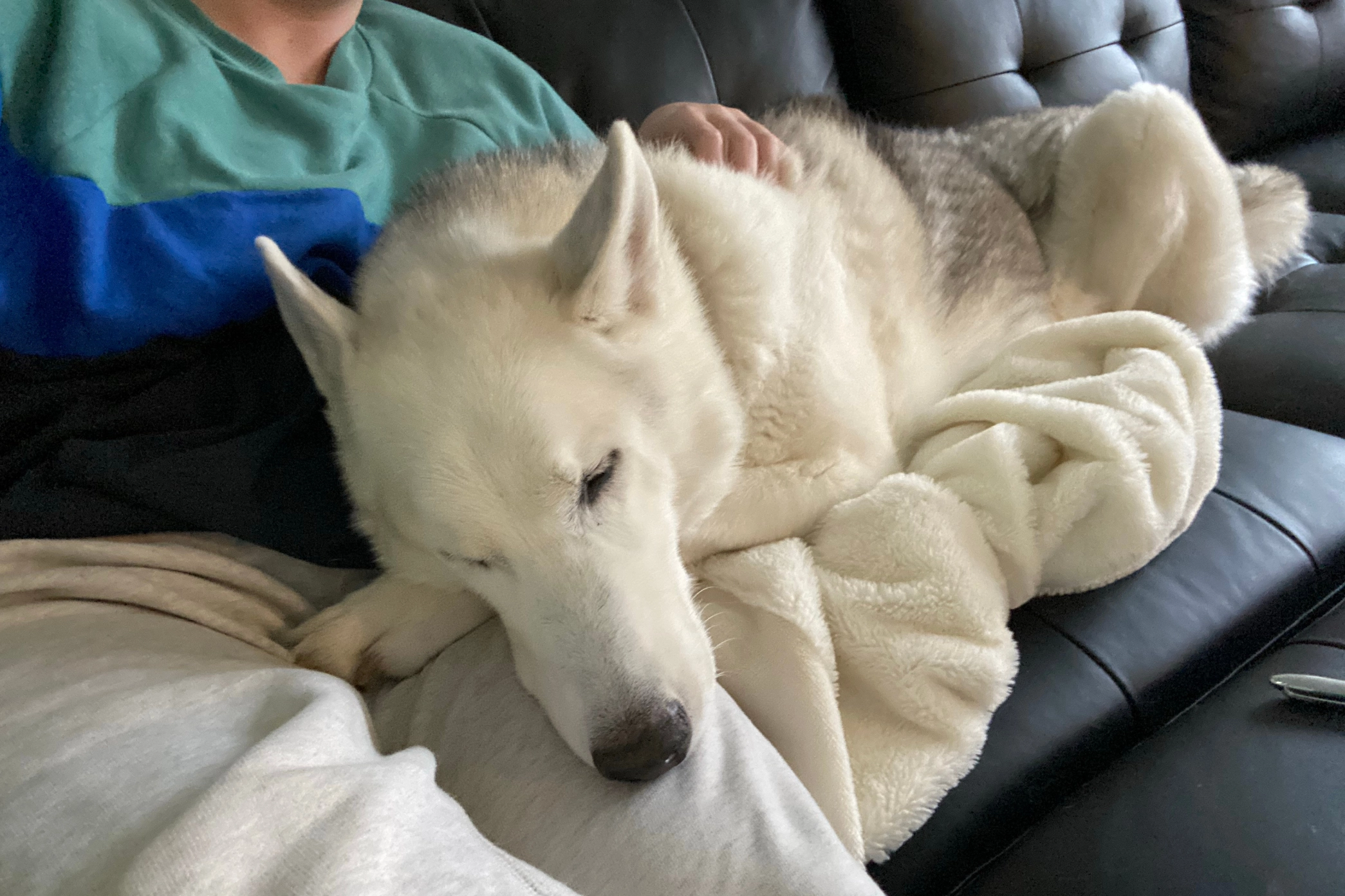
- Consistency is Key:
- Routine: Dogs, particularly those with a traumatic past, find comfort in predictability. Establishing a daily routine – from feeding times to walks – can provide a sense of security.
- Boundaries: While it’s tempting to smother them with love immediately, some dogs need space initially. Respecting their boundaries and letting them come to you at their own pace is crucial.
- Positive Reinforcement:
- Treats and Praises: Rewarding good behavior with treats or verbal praise can create positive associations and foster trust.
- Avoid Punishments: Especially for traumatized dogs, it’s essential to steer clear of negative reinforcements. Instead, focus on redirecting undesirable behaviors.
- Safe Spaces:
- Create a Sanctuary: Having a dedicated space, like a cozy corner or a crate with soft bedding, can serve as their refuge. This spot should be free from loud noises and disturbances.
- Introduce Them Gradually: When introducing them to new spaces, people, or other pets, do it gradually. Overwhelming them can set back the trust-building process.
- Engage in Calm Activities:
- Gentle Play: Engage in games that aren’t overly intense. Simple fetch games or soft toys can be ideal.
- Cuddle Sessions: As they start opening up, moments of physical closeness, like gentle petting or calm cuddle sessions, can deepen the bond.
- Educate Others in the Household:
- Set Rules: Ensure everyone in the house understands and follows the same set of rules when interacting with the dog.
- Introduce Slowly: If there are other members in the household, let the dog meet them one at a time in a calm environment.
Trust, especially with a senior dog carrying the weight of past experiences, isn’t built overnight. It’s a delicate dance of patience, understanding, and consistent love.
But once that bond solidifies, the resulting companionship is deeply fulfilling, enriching both the dog’s life and yours in ways beyond measure.
Navigating End-of-Life Care when Fostering Senior Dogs
As enriching as the journey of fostering a senior dog can be, it also brings with it the inevitable reality of navigating their twilight years. Grappling with end-of-life care is one of the most emotionally taxing aspects of the experience, but it’s also one of the most profound demonstrations of love and dedication.
Here’s a heartfelt guide to navigating this delicate phase with grace, compassion, and understanding.
Recognizing When It’s Time
- Physical Indicators:
- Chronic Pain: Despite medications or treatments, the dog might be in persistent pain that adversely affects their quality of life.
- Loss of Appetite: Consistently refusing food or water, or being unable to keep it down.
- Difficulty Breathing: Labored breathing or chronic respiratory issues that don’t improve with treatment.
- Mobility Issues: Severe difficulty moving around, standing, or an overall reluctance to move.
- Behavioral Signs:
- Loss of Interest: No longer showing enthusiasm for things they once enjoyed, be it toys, treats, or interactions.
- Isolation: Seeking solitude, avoiding family members or other pets.
- Incontinence: Consistent loss of bladder or bowel control, especially if they seem unaware or indifferent to it.
Providing Comfort and Compassion
- Palliative Care:
- Consult with a Veterinarian: They can guide on pain management, dietary adjustments, and other ways to ensure the dog’s comfort.
- Comfortable Environment: Soft bedding, warm blankets, and quiet spaces can provide relief and serenity.
- Quality Time:
- Cherish the Moments: Spend quality time with them, whether it’s gentle petting, soft conversations, or just sitting by their side.
- Treats and Favorites: Offer their favorite treats or toys, anything to bring a bit of joy.
- Seeking Professional Guidance:
- Euthanasia: In some cases, it might be the kindest option to relieve a dog’s suffering. Consult with a veterinarian about the process, ensuring it’s as peaceful and painless as possible.
Coping with Grief
- Allow Yourself to Mourn: Remember, it’s okay to feel. Grieving is a natural process, and there’s no ‘right’ way to navigate it. Everyone’s journey is unique.
- Seek Support:
- Pet Loss Support Groups: Many communities offer support groups where individuals can share their experiences and feelings.
- Counseling: Professional counseling or therapy can provide tools and strategies to cope.
- Celebrate Their Life:
- Memorialize: Create a scrapbook, plant a tree, or hold a small memorial ceremony with loved ones to honor and celebrate the life of your cherished companion.
- Share Stories: Talk about the happy moments, the quirks, the love. Celebrate their life by remembering the joy they brought.
End-of-life care for a senior dog is a journey of deep introspection, unconditional love, and coming to terms with the ephemeral nature of life. Through all its challenges, it’s a testament to the depth of the bond you’ve forged.
By approaching it with compassion and understanding, you ensure that your beloved canine companion finds peace, comfort, and love in their final moments.
Senior Citizens as Senior Dog Fosters
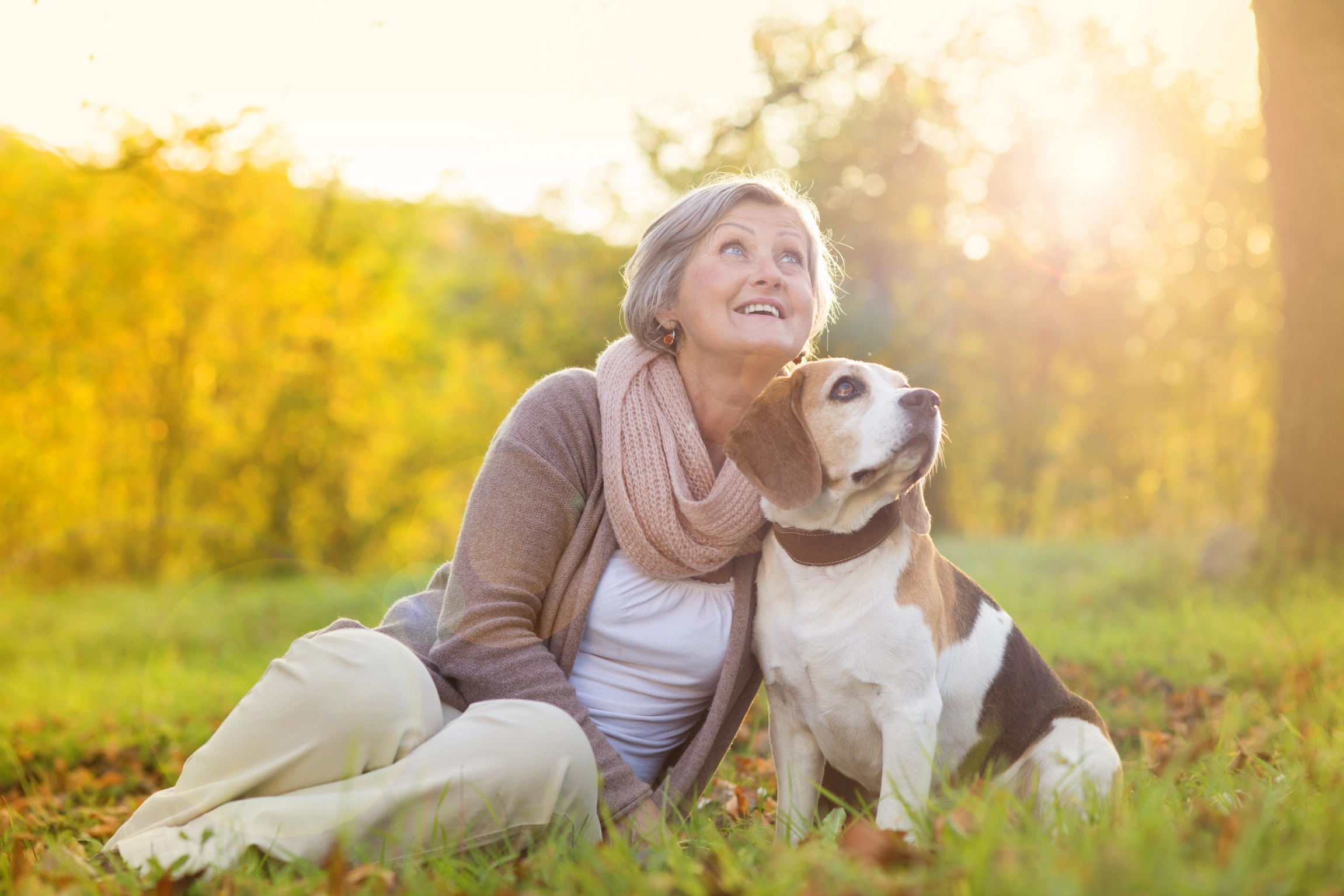
When considering the beautiful tapestry of life, there’s a particular synergy between senior citizens and senior dogs. Both, in their golden years, carry a wealth of experiences, stories, and a shared understanding of the beauty and fragility of life.
For senior individuals, fostering older dogs isn’t just an act of charity—it’s a mutually enriching relationship that can breathe new vitality into everyday living.
The Mutual Benefits
Combatting Loneliness:
Shared Companionship: The quiet presence of a senior dog can fill an empty home with warmth and purpose. The silent understanding, the shared naps, the quiet moments of reflection — these bonds combat the solitude that many seniors face.
Conversations & Connections: Taking a dog out for a walk or simply caring for them can be an icebreaker, sparking conversations with neighbors or fellow dog lovers, fostering a sense of community.
Staying Active and Engaged:
Routine Responsibilities: Feeding, grooming, and walking a dog instills a sense of responsibility and routine, giving structure to daily life.
Physical Activity: Gentle walks with a senior dog provide light exercise, which is essential for maintaining good health and mobility for both the human and canine senior.
Mental Stimulation: The act of caregiving, coupled with training or even just interacting with the dog, keeps the mind engaged and active.
The Bond of Shared ‘Senior’ Status:
Empathy and Understanding: Both having traversed the highs and lows of life, there’s an innate sense of empathy. Whether it’s understanding the need for a slower pace, or simply offering a comforting presence during a down day, they inherently ‘get’ each other.
Shared Moments: The mutual appreciation for life’s simpler joys, like a sunny spot on a cold day or the joy of a favorite treat, deepens their bond.
Legacy of Love: For many senior individuals, especially those pondering the larger questions of legacy and purpose, providing a loving home to a senior dog gives a profound sense of purpose and fulfillment. It’s a testament to the adage that love knows no age.
For senior citizens, fostering an older dog is like finding a kindred spirit. It’s a meeting of souls at similar life stages, each offering the other a unique kind of companionship, understanding, and love.
The relationship becomes a beautiful dance of shared golden moments, a testament to the timeless and ageless nature of love and companionship.
Preparations and Considerations when Fostering Senior Dogs
Embarking on the journey of fostering a senior dog requires more than just a compassionate heart; it calls for preparation and foresight. Setting up a conducive environment and considering long-term plans ensures that the fostering experience is enriching for both the dog and the foster.
Here are crucial preparations and considerations to factor in.
Setting Up a Dog-Friendly Home
- Accessibility:
- Ramps and Steps: Older dogs might have mobility issues, so consider adding ramps for stairs or getting steps for high beds or couches.
- Non-Slip Mats: Place these on slippery surfaces to prevent falls and give the dog better traction.
- Comfort Zones:
- Soft Bedding: Senior dogs often suffer from arthritis or sore joints. Offering orthopedic dog beds can provide the comfort they need.
- Quiet Corners: Designate peaceful areas in your home where the dog can relax undisturbed, away from excessive noise or activity.
- Safety Measures:
- Fenced Yard: If you have an outdoor space, ensure it’s securely fenced to prevent the dog from wandering off.
- Clear Hazards: Remove or secure any potentially harmful items, like electrical cords or toxic plants.
Finding Support Systems
- Dog-Walking Services:
- Professional Dog Walkers: If you’re unable to walk the dog consistently, consider hiring a trusted dog walker familiar with handling senior dogs.
- Community Volunteers: Some neighborhoods have community groups where members volunteer to assist each other. Check for local dog enthusiasts willing to lend a hand.
- Veterinary Visits:
- Choose a Local Vet: Establish a relationship with a local veterinarian familiar with the unique needs of senior dogs.
- Mobile Vet Services: If transport becomes a challenge, some veterinarians offer home visit services.
- Backup Care:
- Friends & Family: Enlist trusted friends or family members who can step in to care for the dog during emergencies or if you need to be away.
- Respite Fosters: Some rescue organizations have a network of “respite fosters” who can temporarily care for foster dogs when the primary foster needs a break.
Considering Long-Term Plans for the Dog
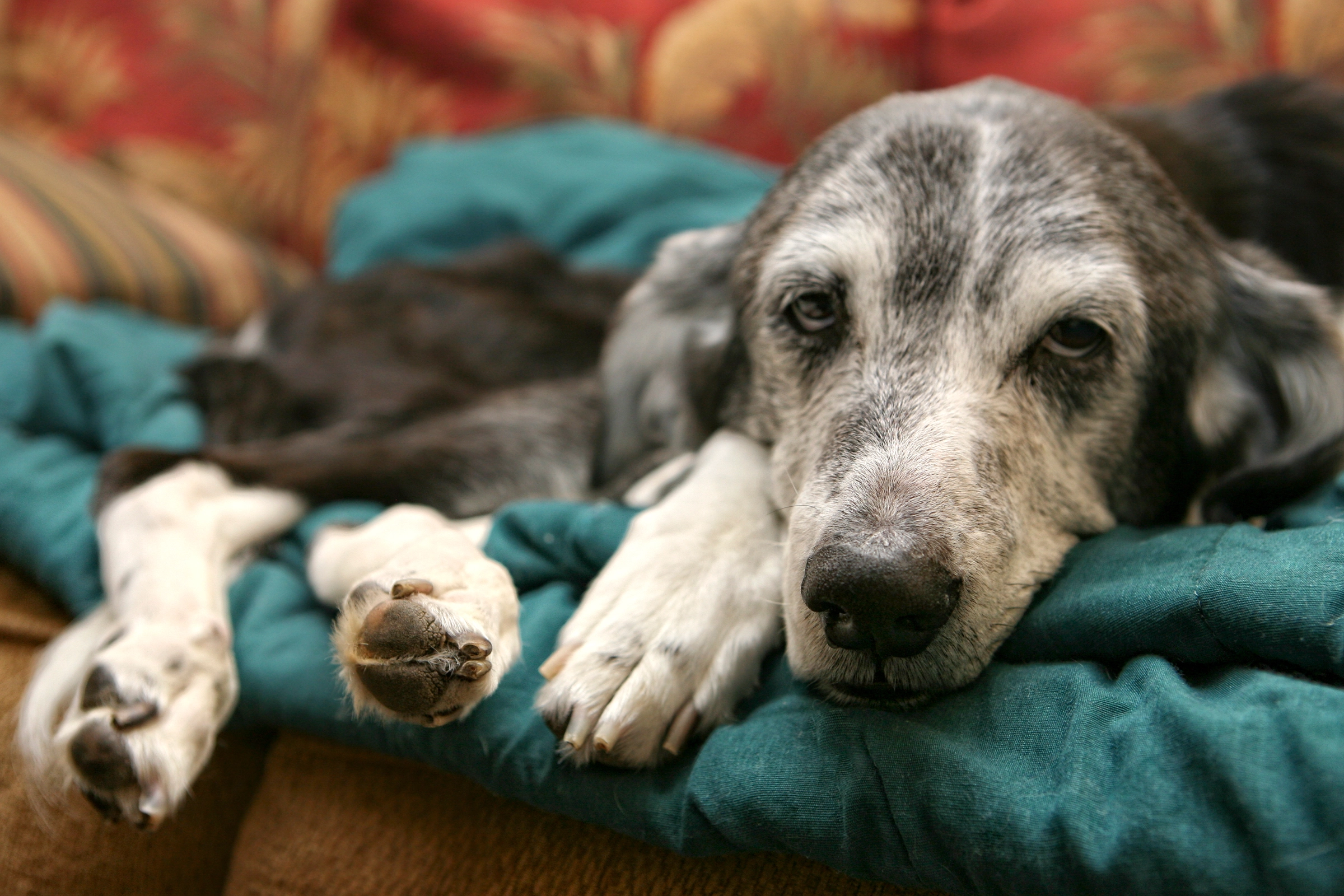
- Adoption:
- Promoting Adoption: If you’re fostering with the intention of finding a permanent home for the dog, work with rescue organizations to promote the dog’s adoption.
- Personal Adoption: Sometimes, fosters become “foster fails” and choose to adopt the dog themselves. Consider if this is an avenue you’re open to.
- Contingency Plans:
- Plan Ahead: Consider what would happen to the dog if, for any reason, you’re unable to continue fostering. Discuss options with the rescue organization, or draft a pet care agreement with trusted friends or family.
- Financial Preparations: Set aside or consider pet insurance for unforeseen medical emergencies.
Preparing to foster a senior dog is akin to setting the stage for a new chapter filled with love, care, and shared memories.
By thoughtfully setting up your space, creating a robust support system, and considering long-term scenarios, you ensure that this chapter is as smooth, joyful, and fulfilling as possible for both you and your canine companion.
FAQs Regarding Fostering Senior Dogs
Fostering senior dogs, while incredibly rewarding, can bring about a myriad of questions, especially for those new to the experience. Here are answers to some of the most frequently asked questions regarding senior dog fostering:
The duration a senior dog spends in foster care can vary widely. Factors influencing this include the dog’s health, behavior, the rescue organization’s resources, and the availability of potential adopters.
On average, a senior dog might stay in foster care for several weeks to several months. However, in some cases where the dog has specific needs or there are fewer potential adopters, it could be longer.
Most reputable rescues and shelters provide comprehensive support to foster families. This support can include:
Medical Care: Covering veterinary expenses, medications, and special diets.
Training and Behavior Support: Guidance on managing any behavioral issues or providing access to professional trainers.
Supplies: Providing essentials like food, bedding, toys, and grooming tools.
Adoption Assistance: Help in finding a permanent home for the dog, if that’s part of the fostering agreement.
Emotional Support: Many organizations have a support network or community where fosters can share experiences, seek advice, or simply connect with others in the same journey.
Helping a senior dog adjust requires patience and understanding. Here are some suggestions:
Routine: Keeping a consistent routine can provide comfort and predictability.
Quiet Space: Ensure the dog has a calm and quiet space of their own, free from loud noises or disruptions.
Gentle Introduction: Introduce them slowly to other household members or pets, monitoring interactions to ensure everyone gets along.
Familiar Items: If the dog comes with any items from their previous home or shelter, like a favorite toy or blanket, keep these items close to provide a sense of familiarity.
Immediate action is essential. Here’s what you can do:
Contact the Veterinarian: If the rescue/shelter has a designated vet, contact them immediately. If not, take the dog to your nearest veterinarian.
Inform the Rescue/Shelter: Keep the organization in the loop regarding any health issues or concerns. They might provide guidance or additional resources.
Monitor Closely: Be vigilant about noting any changes in behavior, appetite, or physical condition, and communicate these to the veterinarian.
Yes, many foster families end up adopting their senior dogs, a phenomenon often lovingly referred to as a “foster fail.”
If you find yourself deeply bonded and wish to make the arrangement permanent, contact the rescue or shelter to discuss adoption procedures. They’ll guide you through the process, ensuring the dog’s transition from foster pet to forever family member is seamless.
Final Thoughts on Fostering Senior Dogs
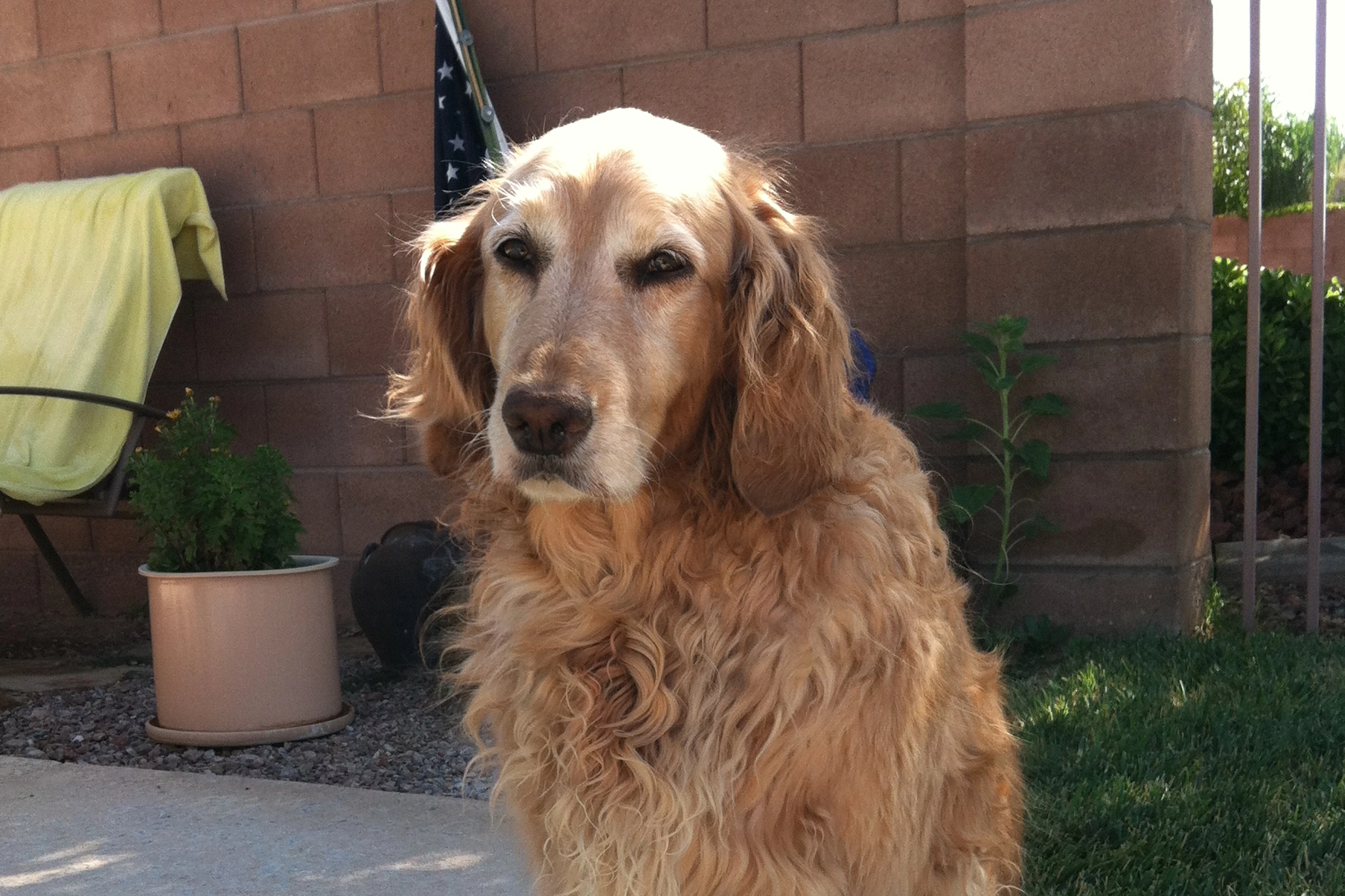
As we journey through the rich tapestry of life, certain bonds leave an indelible mark on our souls, changing us in ways we never anticipated. One such bond is the connection we forge with senior dogs.
These aging companions, with their greying muzzles and wise eyes, carry stories of lifetimes lived, lessons learned, and love given freely. They remind us of the beauty found in the everyday, the profoundness of simple joys, and the purity of a love that asks for nothing in return.
The journey of fostering a senior dog is not just about providing a temporary haven. It’s about becoming a part of their story, if only for a chapter.
It’s about opening our hearts to the unique joys, challenges, and lessons that come with their golden years. For in their twilight days, senior dogs have a way of shining the brightest light into our lives, illuminating parts of our hearts we never knew existed.
If this journey speaks to your heart, I encourage you to consider fostering a senior dog. It might just end up being one of the most rewarding chapters of your life.
Step forward with compassion and open arms, and let an older canine companion step into your life with tales of love and loyalty.
This is My Wish
On a personal note, as I spend my days with Daisy and Gunner, their gentle presence serves as a daily reminder of the love, resilience, and joy that senior dogs bring. Each day, I am filled with hope, not just for their future, but for all senior dogs out there.
May every aging tail find a compassionate lap, every wise eye see love reflected back, and every old heart find a rhythm in the company of someone who cares.
-

Coffee Mug – In Dog Coffees I’ve Only Had One
$11.95 – $14.95 Select options This product has multiple variants. The options may be chosen on the product page
